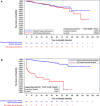Hypertension in Acromegaly in Relationship to Biochemical Control and Mortality: Global ACROSTUDY Outcomes
- PMID: 33329385
- PMCID: PMC7734123
- DOI: 10.3389/fendo.2020.577173
Hypertension in Acromegaly in Relationship to Biochemical Control and Mortality: Global ACROSTUDY Outcomes
Abstract
Context: Hypertension is a major cardiovascular risk factor related to increased mortality in acromegaly. Surgical cure of acromegaly is associated with improvement in blood pressure levels, however little is known about the effect of pegvisomant (PEGV) treatment in patients with hypertension. This analysis evaluates outcomes in patients with hypertension and acromegaly included in ACROSTUDY.
Methods: ACROSTUDY is a global non-interventional surveillance study of long-term treatment with PEGV, monitoring its safety and efficacy. The cohort was retrospectively divided in two subgroups: patients with and without hypertension. Stepwise logistic regression and Kaplan-Meyer analyses were performed for testing predictors of mortality.
Results: The total cohort included 2,090 patients with acromegaly treated with PEGV who were followed for a median of 6.8 years (range up to 12.1 years). In ACROSTUDY there were 1,344 patients with hypertension (52.3% males). This subgroup was older, had a higher BMI, and higher prevalence of diabetes, hyperlipidemia, and cardiovascular disease (CVD) when compared to patients without hypertension. During ACROSTUDY, 68 deaths were reported in the hypertension cohort, vs 10 in the cohort without hypertension. Both CVD (p<0.0001) and anterior pituitary deficiencies (p=0.0105) at study entry independently predicted mortality in patients with acromegaly and hypertension; Kaplan-Meier analysis confirmed that CVD significantly impairs survival.
Conclusions: Hypertension is common in patients with acromegaly and significantly increases mortality, especially when there is concomitant CVD. These data suggest that treatment goals should extend beyond IGF-I normalization, and include optimisation of substitution of pituitary deficiencies and scrutinous screening and treatment of CVD.
Keywords: acromegaly; cardiovascular disease; hypertension; hypopituitarism; mortality; pegvisomant; prognosis.
Copyright © 2020 Vila, Luger, van der Lely, Neggers, Webb, Biller, Valluri and Hey-Hadavi.
Conflict of interest statement
GV has received research grants to her institution from Chiasma and Novartis, and consultancy- and/or speakers fees from Pfizer, Novartis and Ipsen. AL has received lecture and/or consulting honoraria from Ipsen, Novartis, and Pfizer; research grants to the Medical University of Vienna from Ipsen and Pfizer. AJL has received grants, consultancy- and speaker’s fees from Pfizer. SN has received research grants and speaker fees from Ipsen, Novartis, and Pfizer, and consulting fees from Ipsen. SW has received honoraria as a member of the Acrostudy Advisory Board, and lecture fees from Pfizer, Novartis and Ipsen. BB has served as PI of research grants from Novartis, Crinetics and Ionis to Massachusetts General Hospital and has received occasional consulting honoraria from Novartis, Crinetics and Pfizer. SV and JH-H are Pfizer employees.
Figures



References
-
- Mestron A, Webb SM, Astorga R, Benito P, Catala M, Gaztambide S, et al. Epidemiology, clinical characteristics, outcome, morbidity and mortality in acromegaly based on the Spanish Acromegaly Registry (Registro Espanol de Acromegalia, REA). Eur J Endocrinol (2004) 151:439–46. 10.1530/eje.0.1510439 - DOI - PubMed
-
- Portocarrero-Ortiz LA, Vergara-Lopez A, Vidrio-Velazquez M, Uribe-Diaz AM, García-Dominguez A, Reza-Albarrán AA, et al. The mexican acromegaly registry: clinical and biochemical characteristics at diagnosis and therapeutic outcomes. J Clin Endocrinol Metab (2016) 101:3997–4004. 10.1210/jc.2016-1937 - DOI - PubMed
Publication types
MeSH terms
Substances
LinkOut - more resources
Full Text Sources
Medical

